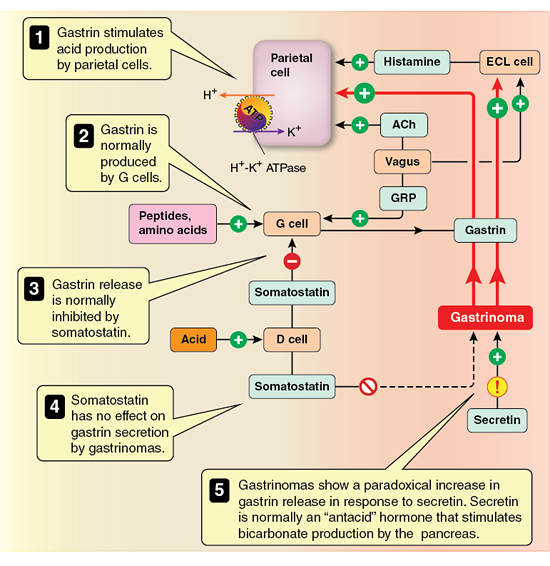If you’re preparing for the United States Medical Licensing Examination® (USMLE®) Step 1 exam, you might want to know which questions are most often missed by test-prep takers. Check out this example from Kaplan Medical, and read an expert explanation of the answer. Also check out all posts in this series.
The AMA and Kaplan have teamed up to support you in reaching your goal of passing the USMLE® or COMLEX-USA®. If you're looking for additional resources, Kaplan provides free access to tools for pre-clinical studies, including Kaplan’s Lecture Notes series, Integrated Vignettes, Shelf Prep and more.
This month’s stumper
A 55-year-old man is admitted to the hospital because of hematemesis. Measurement fasting serum gastrin levels show them to be 8-fold higher compared with a normal individual and an upper gastrointestinal endoscopy shows multiple ulcers in the duodenum. A multiple endocrine neoplasia type 1 is suspected.
Administration of which of the following substances will most likely confirm the diagnosis?
A. Cholecystokinin.
B. Gastric inhibitory peptide.
C. Motilin.
D. Pentagastrin.
E. Secretin.
The correct answer is E.
Kaplan Medical explains why
The patient has Zollinger-Ellison syndrome (ZES); a positive secretin stimulation test is diagnostic.
Zollinger-Ellison syndrome:
- Caused by a gastrin-secreting tumor (gastrinoma) typically located in the pancreas or duodenal wall.
- Gastrinomas are MEN 1 tumors.
- Gastrin is normally produced by G cells located in the gastric antrum or duodenum, its physiologic role being to stimulate gastric acid production by parietal cells.
- Gastrin production is normally subject to negative feedback regulation by the somatostatin and secretin.
- In ZES patients, fasting gastrin levels and acid production is typically elevated, resulting in peptic ulcers and diarrhea. While ZES is strongly suspected in patients with elevated gastrin levels, the test is not diagnostic, however.
- The secretin stimulation test is used to differentiate ZES from other causes of hypergastrinemia.
A secretin stimulation test involves rapid (over about 1 min) intravenous infusion of 2 units/kg secretin. Serum gastrin levels are measured at various times for 30 minutes after injection. Whereas secretin injection inhibits gastrin production in a healthy individual, it markedly increases serum gastrin in patients with ZES (an increase of more than 200 pg/mL is diagnostic). The physiologic mechanism remains unclear.
Why the other answers are wrong
Choice A: Cholecystokinin is a peptide hormone secreted by I cells in the small intestine. It normally stimulates gall bladder contraction, facilitates bile secretion, and stimulates pancreatic enzyme secretion.
Choice B: Gastric inhibitory peptide (GIP, also known as glucose-dependent insulinotropic peptide) is released by K cells in the duodenum and jejunum. It stimulates insulin release from the endocrine pancreas, although it can also decrease gastric acid secretion at sufficiently high levels.
Choice C: Motilin is a hormone secreted by M cells that enhances peristalsis in the small intestine. It has an important role in facilitating migrating myoelectric complexes, which begin in the stomach during a fasting state and drive a peristaltic wave that clears residual intestinal contents (indigestible particles, bacteria, cells that have been shed from the mucosa) from the GI tract in preparation for the next meal.
Choice D: Pentagastrin is a synthetic peptide that stimulates gastric acid production by binding to the gastrin CCKB receptor on parietal cells. Although up to 40% of pancreatic gastrinoma cells contain CCKB receptors, and therefore can respond to either CCK or to gastrin itself, pentagastrin has minimal effects on gastrin secretion and response to its infusion is not reliable as a clinical test.
Tips to remember
- ZES is typically caused by a gastrinoma located in the pancreas or duodenal wall.
- The most simple and reliable test for ZES is secretin injection, which normally inhibits endogenous gastrin secretion, but stimulates gastrin secretion in patients with ZES.
For more prep questions on USMLE Steps 1, 2 and 3, view other posts in this series.




